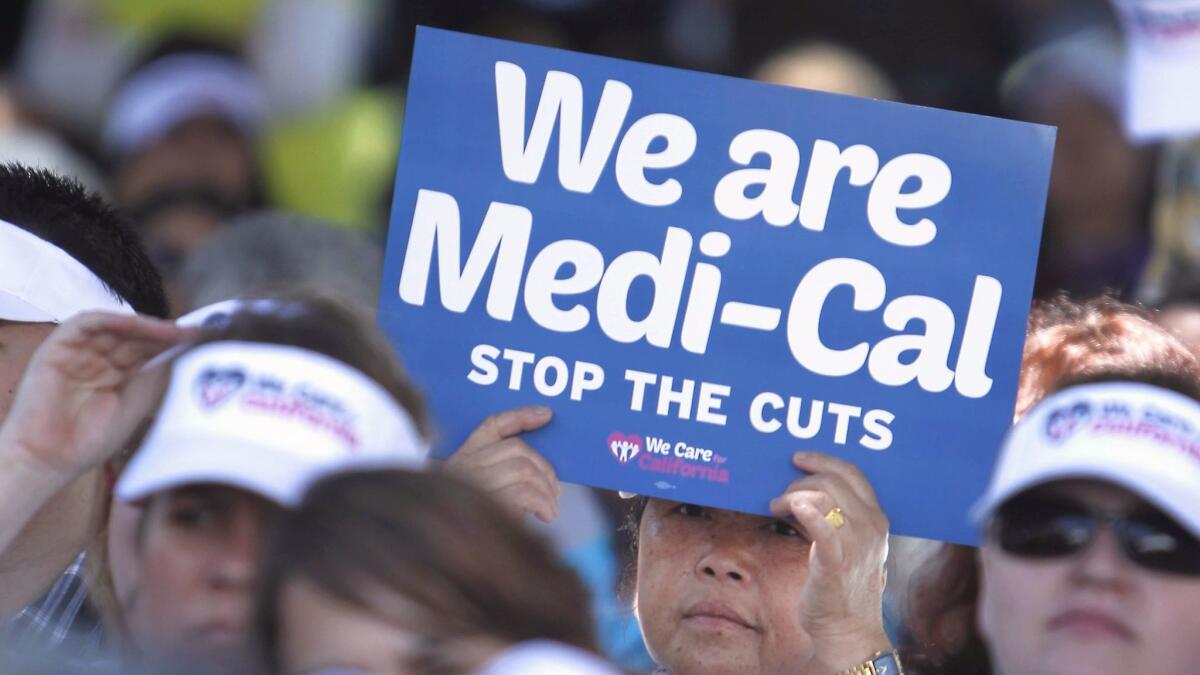Medi-Cal patients sue state, claiming widespread discrimination

- Share via
A group of Medi-Cal beneficiaries filed a lawsuit against the state Wednesday, alleging that low payments to doctors are creating an unequal healthcare system in California.
Thomas A. Saenz, an attorney representing the plaintiffs and president and general counsel for the Mexican American Legal Defense and Educational Fund, said the state is required to provide coverage to low-income Californians through Medi-Cal that’s equivalent to the care other Californians receive through private insurance or Medicare.
But Medi-Cal patients have a harder time finding doctors, wait longer for appointments, end up in the emergency room more often and have their diseases diagnosed later than those in other insurance programs, Saenz said. That’s in part because the state mismanages the health program and delays payments to doctors, making them unwilling to see Medi-Cal patients, he said.
But “the big issue is that the reimbursement rates ... are woefully, woefully inadequate,” Saenz said in an interview.
The suit, filed in Alameda County Superior Court, claims that because the program is majority Latino, the state is essentially discriminating against Latinos.
“California has created a separate and unequal system of healthcare, one for the insurance program with the largest proportion of Latinos,” Medi-Cal, and one for other insurance plans that are majority white, according to the suit.
Reimbursement rates in Medi-Cal were closer to other insurance reimbursement rates when Medi-Cal was a predominantly white program, according to the suit.
“That changed when the Medi-Cal program became increasingly Latino and then majority Latino. That is discrimination,” said Bill Lann Lee, senior counsel of the Civil Rights Education and Enforcement Center, in a statement.
Medi-Cal patients have long struggled to find doctors to see them, but that problem only got worse after the Affordable Care Act expanded the program in 2014, experts say. Medi-Cal now covers 13.5 million Californians — more than 1 in 3 state residents.
Medi-Cal pays doctors about half of what they’d get through Medicare, the government-run health insurance for people over 65. Of the 50 states, California’s Medicaid payment rates rank 48th.
Esther Castaneda, one of the plaintiffs and a Medi-Cal beneficiary, had to wait a year to get her gallbladder removed because she couldn’t get appointments with her doctors or referrals for surgeons who took Medi-Cal, according to the suit. She stopped eating to minimize the extreme pain and vomiting she’d experience otherwise.
She eventually resorted to getting the surgery in Mexico, where a doctor told her she would’ve died without it, according to the complaint.
The lawsuit asks that the state pay doctors enough to ensure that Medi-Cal beneficiaries can receive medical care of similar quality to others in the state and that there are enough doctors who will take Medi-Cal patients.
State officials said Wednesday that the Department of Health Care Services, which oversees Medi-Cal, monitors patients’ access to care.
“DHCS has not identified any systemic problems with patient access to services in the Medi-Cal program nor has the federal Centers for Medicare and Medicaid Services identified any issues,” department Director Jennifer Kent said in a statement to The Times.
soumya.karlamangla@latimes.com
Twitter: @skarlamangla
ALSO
With diabetes rising at alarming rate, California puts money behind prevention campaign
She watched her ex-husband end his life under California’s new right-to-die law. ‘I felt proud’
UPDATES:
3:40 p.m.: This article was updated with a statement from a state official.
This article was originally published at 1:10 p.m.
More to Read
Sign up for Essential California
The most important California stories and recommendations in your inbox every morning.
You may occasionally receive promotional content from the Los Angeles Times.














